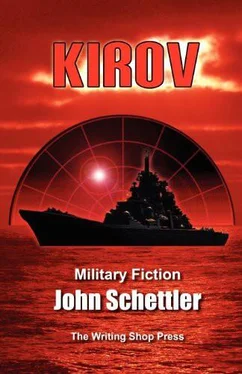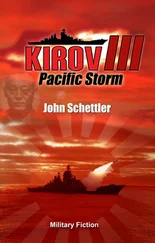John Schettler - Kirov
Здесь есть возможность читать онлайн «John Schettler - Kirov» весь текст электронной книги совершенно бесплатно (целиком полную версию без сокращений). В некоторых случаях можно слушать аудио, скачать через торрент в формате fb2 и присутствует краткое содержание. Жанр: Фантастика и фэнтези, Альтернативная история, на английском языке. Описание произведения, (предисловие) а так же отзывы посетителей доступны на портале библиотеки ЛибКат.
- Название:Kirov
- Автор:
- Жанр:
- Год:неизвестен
- ISBN:нет данных
- Рейтинг книги:5 / 5. Голосов: 1
-
Избранное:Добавить в избранное
- Отзывы:
-
Ваша оценка:
- 100
- 1
- 2
- 3
- 4
- 5
Kirov: краткое содержание, описание и аннотация
Предлагаем к чтению аннотацию, описание, краткое содержание или предисловие (зависит от того, что написал сам автор книги «Kirov»). Если вы не нашли необходимую информацию о книге — напишите в комментариях, мы постараемся отыскать её.
Kirov — читать онлайн бесплатно полную книгу (весь текст) целиком
Ниже представлен текст книги, разбитый по страницам. Система сохранения места последней прочитанной страницы, позволяет с удобством читать онлайн бесплатно книгу «Kirov», без необходимости каждый раз заново искать на чём Вы остановились. Поставьте закладку, и сможете в любой момент перейти на страницу, на которой закончили чтение.
Интервал:
Закладка:
“A single missile? A single torpedo? Perhaps, Karpov, but would you attack in such a manner?”
“With nuclear weapons, one is enough, sir.”
“True, but to miss by a margin sufficient to leave us afloat? This is very unlikely. And no follow-on attack? You are assuming that the enemy sensors are damaged as well, and that they do not know we are still here, steaming quietly at 10 knots with active sonar pinging away just a moment ago?”
Karpov raised his eyebrows. It didn't make sense. And when things did not fit into his carefully ordered perception of the world he was soon at his wits end. If the ship were his to command he would be on an alternate evasive heading at thirty knots. “Have you considered the possibility that Slava may have been destroyed as well, sir?”
“I am considering every possibility, Captain. And I take your concerns under advisement. That is why we will investigate this matter further. If Slava is there, then we will find her, or at least the targeting barges she was towing. If this was an attack, I do not think the enemy would have any interest and sinking them.”
“But what if Slava was also targeted with a nuclear warhead, sir? The barges would have been destroyed as well.”
“Time will tell. And to shorten the wait, let's get the KA-226 up immediately. It will be over Slava's position in 10 minutes.”
He was referring to the KA-226 scout helicopter carried on the aft quarter of the ship. It was ideal when used in an extended reconnaissance role like this.
“See to it, Karpov. Let us answer your questions once and for all. Tell them to rig radiation detection sensors and drop sonar and infrared detection buoys if they make no visual contact with Slava after they reach her last plotted position. If this was an attack, then it should be obvious to us very soon. Even if Slava were sunk, we should still be able to detect the wreckage on the seafloor, particularly on infrared. In the meantime, the ship is at action stations and we will complete our systems diagnostics to assure ourselves we can function should it come to a fight. At the moment we have no targets, gentlemen. So there is nothing more to be done. Now, get that helicopter into the air at once.”
Twenty minutes later they got their first report, yet even the radio transmission seemed distant, distorted and almost garbled at times. This merely added to Karpov’s suspicion that the atmosphere was still experiencing effects of a recent nuclear detonation. And when the KA-226 reported no sign of the Slava, or of any of her towed barges, the Captain was even more certain that the task force had been attacked. He paced anxiously on the bridge, his eyes searching the thickening fog ahead of them as if he expected to see incoming missiles at any moment.
Yet the Admiral sat calmly on his chair, his eyes narrowed with that vacant look of inward thought that so clearly signaled to the others that he was not be disturbed at the moment. What had happened to the rest of his task force? There were 465 men aboard Slava, and another 100 on Orel. Where in god’s name were they? The feeling that had bothered him all morning was back again. He had a clear sense that something profound had happened, but he could not discern what it was. What if Karpov was correct and this was war?
Would NATO launch a surprise attack like this, perhaps from a stealthy submarine that had been lurking undetected in the region? Orel and Slava were gone, yet his ship, the only real threat in the task force, was untouched. The more he considered this the more he began to feel that this had been another accident. Yet if Orel had suffered an accident, where was Slava? She was farther away from the sub’s position than Kirov and should have been well outside the effect radius of a 15 kiloton explosion. These odd incongruities frustrated and blocked his thinking, like pieces of a puzzle that would simply not fit, no matter how hard he tried to force them into a coherent picture.
The rest of the bridge crew sat silent at their posts, watchful, wary, and somewhat on edge. Tasarov had a pained, worrisome expression on his young face. He was checking and rechecking his system, adjusting settings, listening intently, his hand running through his hair at times as he adjusted his equipment. His brow was heavy with concentration, and it was clear that he felt somewhat responsible for the situation. If the ship had been attacked by a torpedo, why didn’t he hear it?
Rodenko, the soft spoken Ukrainian, was equally disturbed. He was the eyes of the ship, where Tasarov was its ears. The fact that he could not even detect the weather front he had been monitoring was most unsettling.
Nikolin sat at his cubicle on communications, flipping through a code book and checking his radio gain and reception bands. All his normal communication channels seemed strangely quiet, and the silence out of Severomorsk was very odd. He had sent coded emergency flash signals, and there should have been an immediate response.
Some of the junior officers seemed lost in their spacious Russian souls. They leaned over their stations, eyes glazed with the milky luminescence of the screens and systems lights, their thoughts running with the old fairy tale hero, Yemelya, the great idler. Life at sea was often endless and dull for them. They could sense that something was amiss, but had not been privy to much of the discussion among the senior officers, and so they watched the interminable sweep of their radar scopes, tuning and adjusting their equipment. Some seemed lost, others alert and curious, their eyes watching the senior officers closely, as recent events had put them on edge.
The remote helicopter reported no sign of radiation, however. And nothing whatsoever was detected by the sonar buoys-no sign of wreckage on the seafloor at all. They even patched the data through to Tasarov, so his better trained eye and ear could verify the findings. There was just nothing there. Infrared sensors, which would have easily detected heat from a ship that had recently endured combat damage sufficient to sink her, reported nothing unusual.
Then Nikolin seemed encouraged as the signal strength from the KA-226 improved dramatically. He had much more clarity, and instinctively looked at Rodenko, who smiled as he reported. “I have a clear reading on the KA-226 now,” he said. “The interference is gone.” Kirov's systems seemed to be in perfect working order, the telemetry being received from the helicopter on Tasarov's panel was pristine. There was simply nothing else there to be seen, so Admiral Volsky ordered the helo to return. He stared out the forward viewports, noting the color of the sea had dimmed and blanched to a sallow gray again.
“Any response from either ship? Severomorsk?” He broke his reverie, turning to his communications officer Nikolin.
“No sir,” said Nikolin. “I have sent encrypted traffic using normal wartime protocols, but I received no response.”
Karpov drifted to the Admiral’s side, his arms clasped firmly behind his back as he leaned slightly to one side and spoke in a quiet tone of voice, as if to prevent the other members of the bridge crew from hearing him. “What if Severomorsk was also attacked, sir? We could be at war.”
The Admiral gave him a serious look, but said nothing.
Part II
“God sets us nothing but riddles. Here the boundaries meet and all contradictions exist side by side…”
— Fyodor DostoevskyChapter 4
The fog around them was so thick now that you could barely see from one end of the ship to the other. The sea was calm and still, and the gray white mist of an ice fog slowly enfolded ship. Soon the gilded masts, radars and antennas were fringed with a hoary white frost, which also settled on the upper decks and superstructure of the ship until she appeared like a great pale white ghost ship silently sliding through the glassy sea.
Читать дальшеИнтервал:
Закладка:
Похожие книги на «Kirov»
Представляем Вашему вниманию похожие книги на «Kirov» списком для выбора. Мы отобрали схожую по названию и смыслу литературу в надежде предоставить читателям больше вариантов отыскать новые, интересные, ещё непрочитанные произведения.
Обсуждение, отзывы о книге «Kirov» и просто собственные мнения читателей. Оставьте ваши комментарии, напишите, что Вы думаете о произведении, его смысле или главных героях. Укажите что конкретно понравилось, а что нет, и почему Вы так считаете.












